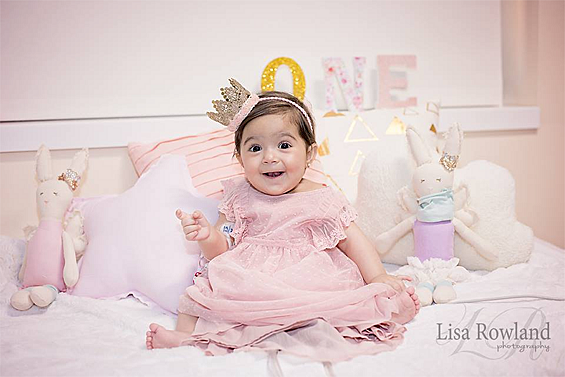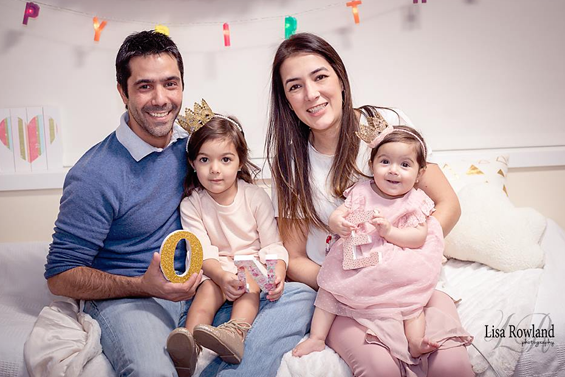How an artificial heart brought a bubbly baby’s smile back


Valeria Ocampo giggles and babbles as most babies do. She likes to play with her toy giraffe and rattle. What separates her from other babies is she does these things now with the help of an artificial heart.
On Jan. 6, 2017, Valeria was born in Orlando without complications. Her mother, Victoria Escobar, explained that her pregnancy also was normal and she greatly anticipated the arrival of her second child. But at 7 months old, Valeria was diagnosed with cardiomyopathy, a heart muscle disease that enlarged her heart. Doctors at the UF Health Shands Children’s Hospital implanted a Berlin Heart®, an artificial heart device made specifically for babies and children facing heart failure.
Difficulties began when Valeria was 5 months old. Victoria and her husband, Carlos Ocampo, noticed Valeria’s irregular breathing and eating patterns. They suspected at first that her food aversion was related to a recent vaccination but, at an Orlando hospital, pediatricians wanted to rule out a muscular or neurological problem. After several inconclusive tests, a gastroenterologist referred Valeria’s parents to a cardiologist.
At 7 months old, Valeria’s echocardiograph revealed a heart defect and she was admitted to the Orlando hospital on the same day as she was diagnosed. Doctors discovered that her aorta had a coarctation, or narrowing, and was overworked while trying to regulate blood rushing back toward the heart.
Valeria’s symptoms worsened suddenly after she was admitted and the family needed a heart failure specialty team that would act quickly. Her heart condition left her pale, skinny and constantly sweaty. Her food aversion caused her to be fussy, Victoria said.
At the recommendation of her physicians, Valeria was transferred by ambulance to the UF Health Shands Children’s Hospital’s pediatric cardiac intensive care unit in Gainesville where F. Jay Fricker, M.D., the medical director of the UF Health Congenital Heart Center and a pediatric cardiologist, kept a close watch on her.
“When we came here [pediatric cardiac intensive care unit], it was so relaxed. They deal with this more often so they know what to do,” Victoria Escobar said.
After running multiple tests and observing Valeria’s condition, Fricker explained to the family that she would need a heart transplant.
“Dr. Fricker said, ‘I’m so sorry but we’re going to have to list her now’,” Victoria Escobar said. “We were in shock. It was very hard to digest.”
On Aug. 25, Valeria was listed for a heart transplant.
Later that same day, Mark Bleiweis, M.D., the director of the UF Health Congenital Heart Center and the chief of congenital cardiothoracic surgery at the UF Health Congenital Heart Center, met with Victoria and Carlos to explain a procedure that would serve as a bridge to Valeria’s transplant. The device, known as a Berlin Heart®, was a mechanical heart that would sustain Valeria until her new heart arrived.
“In my mind, I was dreaming this isn’t true – maybe she will heal,” Victoria Escobar said.
Five days later, Valeria received the artificial heart and started the next stage of her journey. She responded well to the procedure and anesthesiologists told her mother that her color returned minutes after she received her Berlin Heart®. Shortly after Valeria’s surgery, Victoria met with a representative from the Berlin Heart® supplier who was visiting the hospital. As fate would have it, Hurricane Harvey had almost interfered with the delivery of parts to the hospital but it seemed like everything was timed perfectly, Victoria said.
Valeria’s battle did not end there, though. Nurses noticed Valeria was rejecting her pacifier and making grunting noises. A team of intensive care clinicians rushed in and detected and treated her for a collapsed lung.
Since then, Valeria’s health has steadily improved and strengthened. Her family has tried to normalize their stay in the hospital as much as possible by sticking with routines. For instance, Victoria is closely involved with scheduled meals for Valeria, which creates a comforting routine for the baby. Family members have even brought in their own cleaning supplies so they can clean toys and surfaces as they would routinely at home.
In addition to routine, the family also continues to celebrate joyous occasions. Valeria’s grandmother traveled from Madrid, Spain to the UF Health Shands Children’s Hospital to celebrate Valeria’s first birthday. Now hanging next to Valeria’s crib in the unit are tiny formal dresses she wore on her first birthday photoshoot. Maintaining “good vibes” around the baby and hospital room has helped the family cope with this roller coaster, Victoria said.
“I don’t want her to have memories as an ill and very sick child,” Victoria Escobar said. “I want her to remember that we always wanted her to be happy and healthy, and to try to have a life as normal as possible.”